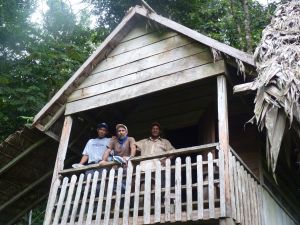Death Threats in Honduras
By Huw Hennessy*
 Jorge Salaverri in white baseball cap in the centreIllegal settlers in Honduras have threatened to kill a local conservationist guide, Jorge Salaverri, in reprisal for an interview he gave in a recent documentary film, “Paradise in Peril”. Salaverri, who has been a naturalist guide to the Río Plátano Biosphere Reserve in Mosquitia for the last 21 years, was protesting about the destruction done to the region by illegal settlers.
Jorge Salaverri in white baseball cap in the centreIllegal settlers in Honduras have threatened to kill a local conservationist guide, Jorge Salaverri, in reprisal for an interview he gave in a recent documentary film, “Paradise in Peril”. Salaverri, who has been a naturalist guide to the Río Plátano Biosphere Reserve in Mosquitia for the last 21 years, was protesting about the destruction done to the region by illegal settlers.
Río Plátano Biosphere Reserve, a vast forested region in north-eastern Honduras, is a UNESCO World Heritage site. With the highest
level of tropical biodiversity in Central America, it is inhabited by the Pech and Miskito iNdians, as well as containing hundreds of unexplored archaeological sites. In recent years it has been targeted by settlers, who exploit the lax protection of the forest, clearing large areas to raise cattle and plant crops. Even more alarmingly, some settlers are being bankrolled and armed by drug smugglers, who use the forest’s dense cover to hide landing strips for light aircraft that transport drugs up from South America, en route to the United States.
Settlers – or “invasores”, as they are locally known – were angered at being shown in the film, produced by US explorer Robert Hyman, and distributed online. Salaverri says he has been told that he is an “easy target” and that he should take care from now on, as they are going to lie in wait for him in the forest, to “hunt him like a deer”. Until recently the Honduran army used to carry out patrols in the headwaters of the Rio Plátano, but since they left the settlers feel emboldened to issue their threats.
In response, Salaverri is now calling on the Honduran government to bring back military protection to the Biosphere Reserve. “I think that the UN should send ‘blue helmets’ to this region”, he says. He fears that the local indigenous people are also at risk. “This situation is threatening the indigenous territory, with anarchy taking over. Many innocent indigenous people are being terrorised by the narcos and the criminality they have brought to Mosquitia.” He wants the army to establish a permanent presence in the heart of the Reserve, and take legal action to stop deforestation. “They should confiscate the settlers’ weapons and chainsaws.”
UNESCO, which recently sent a fact-finding mission to Honduras, has given its own stark assessment of the latest situation in Mosquitia. A spokesman said: “A few years ago it was a simple case of cattle ranchers looking for free land but now what we have is an international hub for drug trans-shipment, with all the resultant warping of local loyalties.” As a result of the mission, the inter-governmental World Heritage Committee has put the Rio Plátano Biosphere Reserve back on its list of endangered sites.
*Huw Hennessy is a journalist who has written about the Rio Plátano Biosphere Reserve in The Independent.

